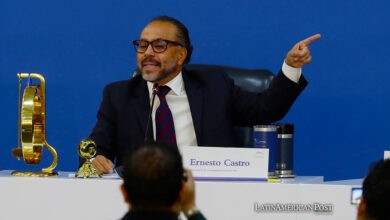El Salvador's President Nayib Bukele's decision to register as a candidate for reelection, in contradiction to the country's constitutional prohibition, raises concerns about the erosion of democratic principles and the potential for a consolidation of power that goes against the fundamental tenets of our Constitution. The pursuit of long-term stability and the preservation of democratic institutions must take precedence over individual ambitions.

10/27/2023.- The president of El Salvador, Nayib Bukele, leaves the Supreme Electoral Tribunal (TSE) after registering as a candidate for the presidency of El Salvador for the period 2024-2029. EFE/ Rodrigo Sura (Edit: Latampost)
The Latin American Post Staff
Escucha este artículo
Leer en español: Defender los principios constitucionales: el caso contra la candidatura del presidente Bukele a la reelección
Upholding Term Limits for a Robust Democracy
El Salvador's President Nayib Bukele's recent decision to register as his party's candidate for the upcoming presidential vote, despite the explicit constitutional prohibition on reelection, raises concerns about the integrity of our democratic institutions. While some may argue in favor of bending or even breaking constitutional rules to accommodate popular leaders, we must prioritize the long-term stability and the fundamental principles enshrined within our Constitution.
Term limits serve as an essential component of a healthy democracy, ensuring a rotation of power and preventing incumbents from amassing too much influence or becoming entrenched in their positions. El Salvador's Constitution currently stipulates a single term of five years for its presidents, a provision carefully designed to prevent potential abuses of power and safeguard the balance of power among branches of government.
Also read: It's Official: The Electoral Campaign For The Presidency of El Salvador Has Already Begun
A Dangerous Precedent: Manipulating Constitutional Rules
The Supreme Court of Justice's ruling in 2021, allowing the president to run for a second term based on a convoluted interpretation of a constitutional article, undermines the notion of judicial independence. A politically motivated court decision risks eroding public trust in the judiciary and sets a dangerous precedent where constitutional rules can be bent for personal or partisan gain.
The decision of President Bukele to seek reelection exhibits troubling signs of an overreach of power and a desire to consolidate his authority. Allowing incumbents to extend their time in office beyond what the Constitution allows opens the door to potential abuses of power, encourages the concentration of authority, and weakens the checks and balances essential to a thriving democracy. We must remain vigilant and guard against any erosion of our democratic principles.
Beyond Popularity: Preserving Democratic Foundations
While President Bukele undoubtedly has a significant base of supporters, it is crucial to consider the broader implications of his reelection campaign. The constitutional prohibition against reelection is not a mere technicality but reflects the collective will of the nation and the need to prevent the consolidation of power. Any attempt to bypass or alter this provision undermines the democratic process and disregards the broader wishes of the Salvadoran people.
El Salvador has made remarkable strides in recent years towards consolidating democracy and ensuring transparent governance. However, President Bukele's decision to seek reelection disregards the constitutional provision to safeguard our democratic institutions. Upholding term limits, respecting judicial independence, and preventing the concentration of power are vital principles that must prevail in our nation. We must remain steadfast in our commitment to the Constitution and safeguard the democratic values that we hold dear.





